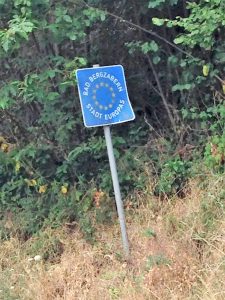
The Sense of Europe in our personal daily lives – Stories for Europe
I live on the edge of Bad Bergzabern, a beautiful little town in Palatinate, south-west Germany. Whenever I visit downtown I come across the blue sign with the yellow stars which says: “Bad Bergzabern – Stadt Europas”. Someday I pass this sign several times. However, it seems that I never really noticed it. It stands there so inconspicuously and humbly between the trees that it can easily be overlooked between the colourful advertising banners of the city.
This morning when driving my kids to school I gave the sign a special greeting because what it means is too important to be ignored, and I started thinking about what “Stadt Europas” or Europe in general means to me and to my family in concrete terms in our day to day lifes:
The possibility for German-French friendship
First of all living in Bad Bergzabern means to live only 9 kilometres away from the border to Alsace, France. A region battered by French-German wars with a history full of hostility and disunity, which you easily forget nowadays when walking to Wissembourg on a Sunday afternoon stroll without even noticing that you cross the border. Often we take friends for a walk from Schweigen-Rechtenbach, Germany, through the beautiful vineyards to enjoy tart flambé in France. It is not so long ago (before the Schengen agreement in the 1980er) that one had to pass control posts and to exchange money from deutschmark into franc to pay for a café au lait or for a baguette. I still remember this very well. Today our children know this only from narrations.
There are so many other, often small things that come to my mind: My favourite cashier in the supermarket is a Frenchman, and I often consciously go to his cash desk because he has a friendly word for everyone with his nice French accent. We have German-French peasant and rose markets, boarder festivals and so on.
My girls visit the Alfred-Grosser-Schulzentrum and learn French as their first foreign language. They have French classmates and some of their teachers are French too, so they learn French from native speakers void of any accent. It is even possible for them to complete the French BAC and then study in France.
The name patron of their school is the 92 year old French political scientist and publicist Alfred Grosser who once escaped from Nazi-Germany to France and since then is a progressive thinker and fighter for the German-French friendship and for Europe. In his recently published book “Le Mensch” he proclaims:
Europe will only develop its spirit when it is a matter of the heart, a matter of personal encounters and experience.
Two weeks ago he visited “his” school and left a deep (and hopefully long lasting) impression on pupils, teachers, and parents.
I was thinking hard, but no single negative effect about Europe, which affects our daily life passes, my mind. Europe and in our case the closeness to France enriches our lives in many ways. Of course, these are no political or economic thoughts, just personal impressions. But what when we not just listen to the bad news around Europe like Brexit, liabilities in Greece, the economic crisis in Italy, but rather put our focus on our more personal experiences with Europe? Most likely, Europe’s face will exhibit much nicer and more hopeful features in this way.
What about your experiences with Europe? Let us start and re-think and re-narrate the stories of Europe. For that please check out www.stories-for-europe.eu and let us invite you to a very special event:
Stories for Europe – Kick-off
Join us (September Fri, Sep 15, 2017 3:00pm till Sat, Sep 16, 2017 4:00pm, in Aachen at the beautiful Gut Rosenberg) to make the first steps around Stories for Europe with us (for more information click here)
What is it about?
- What does Europe mean for us today?
- What are our hopes and fears for and around Europe?
- What is Europe calling us to do?
- How can we shape the stories of Europe? .
Please save the date and be part of our pro Europe movement!
All the best,
Karin Thier

